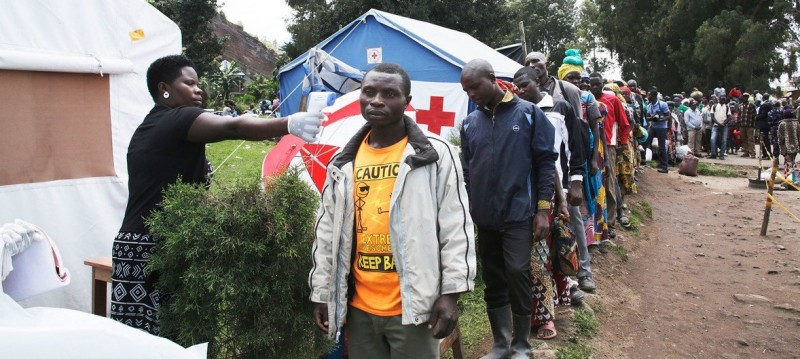Medical staff routinely check people who enter Uganda from the DRC for Ebola symptoms (file, 2019) The UN health agency, WHO, announced on Wednesday that it is speeding up efforts to respond to a fresh outbreak of the deadly, infectious Ebola disease in Uganda. So far, seven cases of the rare Sudan strain of the virus, including one death, have been confirmed in the east African country. The announcement comes two days after WHO confirmed the first new case, after six suspicious deaths were reported in Mubende district earlier this month. Forty-three contacts have been identified, and 10 people are believed to have caught the virus, and are receiving treatment at the regional referral hospital in Mubende, making it the first time Uganda has detected the Sudan ebolavirus since 2012. Mubende is located in the central region of Uganda, around two hours by car from the capital Kampala, along a busy road leading to the Democratic Republic of the Congo (DRC). There are gold mines in the area, which attract people from different parts of Uganda, as well as other countries; WHO explained that, because of the mobile nature of the population in the region, there is an increased risk of the virus spreading further. WHO’s response to the outbreak has involved delivering medical supplies, providing logistics and deploying staff to support the Ugandan authorities in halting the spread of the virus. A technical team has been sent to Mubende district to support surveillance, infection prevention and control, and the management of cases. Surveillance is being ramped in neighbouring districts, and local staff are on the front line, to bolster the Ebola response. Five international experts are also being deployed, with more on standby if needed. “We are acting quickly and decisively to draw the reins on this outbreak”, said Dr Abdou Salam Gueye, Regional Emergency Director with the WHO Regional Office for Africa. “Africa’s stronger homegrown emergency readiness is proving ever more crucial in tackling outbreaks such as Ebola.” Ebola can be deadly, but early identification of cases and treatment of symptoms greatly increases the chances of survival. None of the current Ebola vaccines are effective against the Sudan strain identified in Uganda, but at least six candidate vaccines are in different stages of development. The WHO Research and Development Blueprint team is in contact with all developers and is leading a collaborative effort involving international experts to determine which of the vaccines may be suitable for additional evaluation during this outbreak, should more cases be confirmed. 
‘Drawing the reins’ on the outbreak
Vaccine development
Related Posts
WEJ PROJECTS
© 2009-2025, World Economic Journal. All Rights Reserved. Republishing permitted with attribution and active hyperlink to the original source.

